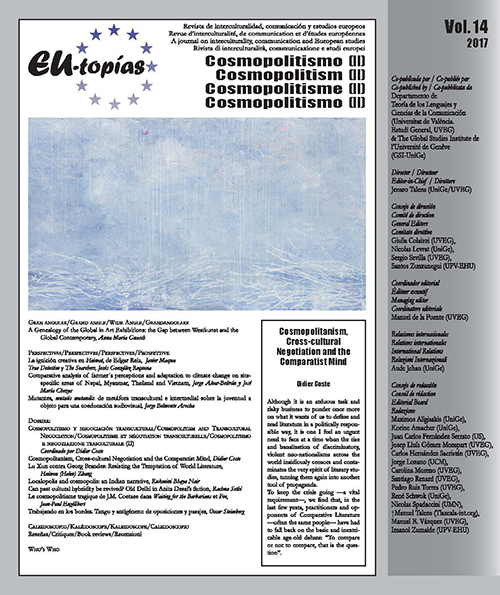Working on the edges. Tango and antigenre: on oppositions and passage
DOI:
https://doi.org/10.7203/eutopias.0.18601Keywords:
ango, style of a period, translation, transposition, anti-generic cross-cultural negotiation Abstract
Abstract
The style of a period, not exactly a style, but an interplay of many stylistic operators, is an interesting site to observe the emergence of self-conscious ‘anti-genres’ through a rhetoric of irony and self-irony. Translation and transposition –viewed as the pursuit of a conversation in different languages— offer, for example, a new perspective on tango and its contrasted historical moments, insofar as its three semiotic components have come to aggregate three different ‘cultures’ that dialog between them, beyond social, ideological and other fractures: while the dance component has constantly remained explicitly sensual and erotic, the lyrics changed from funny and vulgar to melancholic, and the instrumental music around the glorified bandoneon, became the site for all kinds of experiments. This anti-generic cross-cultural negotiation is cosmopolitan enough to have acquired world audience and practice.
 Downloads
Downloads
 References
References
Jakobson, Roman, “Le folklore, forme spécifique de création”, en Questions de poétique, París, Seuil, 1973, pp. 62-70.
Levi-Strauss, Claude, “Anthropologie et folklore”, en Anthropologie structurale, París, Plon, 1958, p.393.
Schaeffer, J.-M., « Folklore », en Nouveau dictionnaire encyclopédique des sciences du langage, Paris, Seuil, 1995, pp. 505-506.
Downloads
Published
How to Cite
-
Abstract240
-
PDF (Español)55
Issue
Section
License
![]()
The authors conserve the copyright. All content published in EU-topías. Journal of interculturality, Communication, and European Studies are subject to the license Creative Commons Attribution-NonCommercial-ShareAlike 4.0 license. The full text of the license can be found at <http://creativecommons.org/licenses/by-nc-sa/4.0>
They may be copied, used, disseminated, transmitted and publicly displayed, provided that:
- The authorship and original source of the publication is cited (journal, publisher and URL of the work).
- They are not used for commercial purposes.
- The existence and specifications of this license of use are mentioned.
It is the responsibility of the authors to obtain the necessary permissions for images that are subject to copyright.



